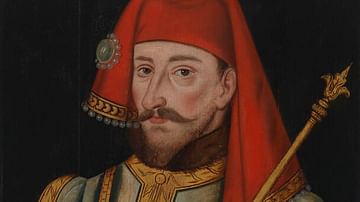Search
Did you mean: Vinland?
Search Results

Definition
Henry VI of England
Henry VI of England ruled as king from 1422 to 1461 and again from 1470 to 1471. Succeeding his father Henry V of England (r. 1413-1422), Henry VI was crowned the king of France in 1431 but he could not prevent a French revival led by Charles...

Definition
King John of England - England's Most Unpopular King?
King John of England (aka John Lackland) ruled from 1199 to 1216 CE and he has gone down in history as one of the very worst of English kings, both for his character and his failures. He lost the Angevin-Plantagenet lands in France and so...

Definition
William III of England
William III of England (also William II of Scotland, r. 1689-1702) became king of England, Scotland, and Ireland after the Glorious Revolution of 1688. Protestant William, Prince of Orange, was invited to rule jointly with his wife Mary II...

Definition
Henry IV of England
Henry IV of England ruled as king from 1399 to 1413 CE. Known as Henry Bolingbroke, Duke of Lancaster before he became king, Henry clashed with his cousin Richard II of England (r. 1377-1399 CE) and was exiled in 1397 CE. Returning to England...

Definition
Edward IV of England
Edward IV of England ruled as king from 1461 to 1470 CE and again from 1471 to 1483 CE. The Hundred Years' War (1337-1453 CE) had been lost by Edward's predecessor, Henry VI of England (1422-1461 CE & 1470-1471 CE), leaving Calais as the...

Definition
Charles I of England
Charles I of England (r. 1625-1649) was a Stuart king who, like his father James I of England (r. 1603-1625), viewed himself as a monarch with absolute power and a divine right to rule. His lack of compromise with Parliament led to the English...

Definition
Henry V of England
Henry V of England ruled as king from 1413 to 1422. Succeeding his father Henry IV of England (r. 1399-1413), Prince Henry established himself as a fine military leader in battles against English and Welsh rebels in the first decade of the...

Definition
King Stephen of England
King Stephen of England, often called Stephen of Blois, ruled from 1135 to 1154 CE. His predecessor Henry I of England (r. 1100-1135 CE) had left no male heir and his nominated successor, his daughter Empress Matilda, was not to the liking...

Article
The Danish Conquest of England
The Danish conquest of England was not a singular event, but a series of large Viking invasions of England between 1013 and 1016, which eventually overthrew the native English dynasty. As a result, four kings from the House of Denmark ruled...

Definition
Richard I of England
Richard I of England, also known as Richard the Lionheart (Cœur de Lion), reigned as king of England from 1189 to 1199. The son of Henry II of England (r. 1154-1189) and Eleanor of Aquitaine (c. 1122-1204), Richard was known for his courage...